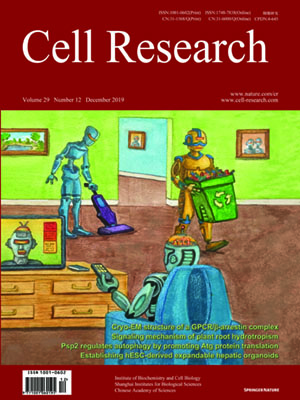
Volume 29, No 12, Dec 2019
ISSN: 1001-0602
EISSN: 1748-7838 2018
impact factor 17.848*
(Clarivate Analytics, 2019)
Volume 29 Issue 12, December 2019: 1042-1045
LETTERS TO THE EDITOR
Cathepsin B inhibitors block multiple radiation-induced side effects in C. elegans
Lingjun Zheng 1,2, Xiaoqi Wu 1,2, Shanshan Li3, Bin Liu1 and Ding Xue2
1 College of Food Science, Fujian Agriculture and Forestry University, Fuzhou 350002 Fujian, China; 2Department of Molecular, Cellular, and Developmental Biology, University of Colorado, Boulder, CO 80309, USA and 3School of Life Sciences, Tsinghua University, Beijing 100084, China
Correspondence: Bin Liu (liubin618@hotmail.com) or Ding Xue (Ding.Xue@Colorado.edu)
Dear Editor,
Radiotherapy (RT) is one of the major treatments for cancer patients, but its application in cancer therapy has been limited due to deleterious side effects caused by radiation,1 which include dry mouth, fatigue, nausea, skin irritation, low blood cell counts, and infertility. These side effects, also called radiation-induced bystander effects (RIBE), are caused by factors released from irradiated cells or tissues, which can act either short- or long-range to impact nearby or distant unexposed cells and tissues to induce genomic instability, stress response, and altered cell proliferation or death.2 RIBE thus is a critical factor in determining the efficacy and success of RT in cancer treatment and a major safety concern to people with occupational exposure to radiation, such as aircrew members, medical workers, and laboratory researchers.1,2 There is no effective way to prevent adverse side effects caused by radiation and RT. This has been a longstanding medical issue that demands an urgent solution.1
https://doi.org/10.1038/s41422-019-0247-3
FULL TEXT | PDF
Browse 1205


